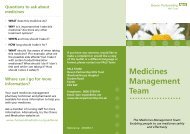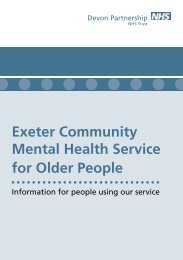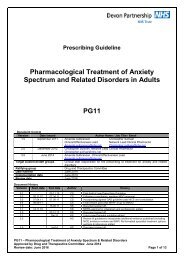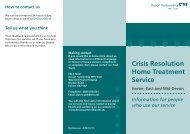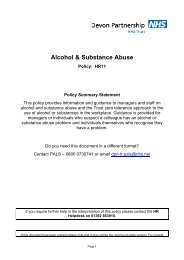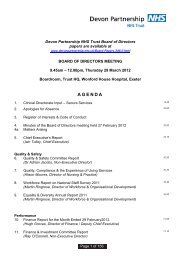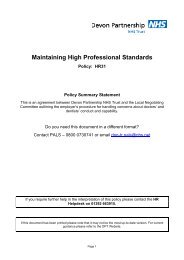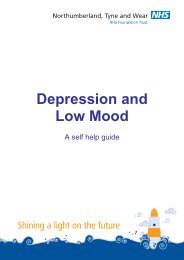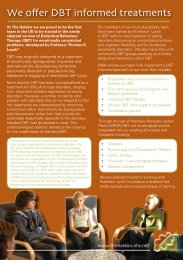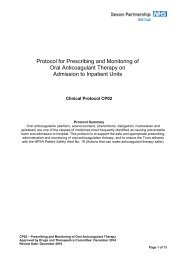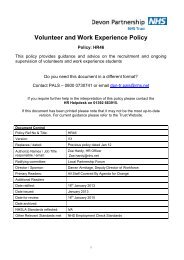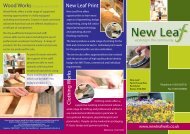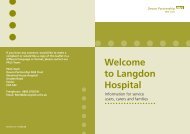BPSD - Devon Partnership NHS Trust
BPSD - Devon Partnership NHS Trust
BPSD - Devon Partnership NHS Trust
You also want an ePaper? Increase the reach of your titles
YUMPU automatically turns print PDFs into web optimized ePapers that Google loves.
Appendix 1<br />
Decision aid for specialist treatment strategies: Severe <strong>BPSD</strong><br />
There is a lack of high quality clinical trial evidence to support the effectiveness of medication for <strong>BPSD</strong><br />
(with evidence base generally based on Alzheimer’s dementia rather than vascular/stroke related, frontotemporal<br />
lobe, mixed or DLB), however increasingly there is information which questions their safety. The<br />
table below is designed to provide you with a summary the available evidence for drugs used for the<br />
management of <strong>BPSD</strong> (specific to aggression, agitation and/or psychosis), along with a summary of<br />
possible side effects and precautions required.<br />
ANTIPSYCHOTICS<br />
Evidence of efficacy in <strong>BPSD</strong>, though limited, is greatest for risperidone and olanzapine, however, clinical<br />
efficacy is at best only modest and this must be balanced against elevated risk of cerebrovascular adverse<br />
events, mortality, upper respiratory infections, oedema, extrapyramidal symptoms and an increase in overall<br />
mortality rate which applies to ALL ANTIPSYCHOTICS (first and second generation) and not just<br />
risperidone and olanzapine as originally reported in the Committee of Safety of Medicines alert (2004).<br />
Summary of risks and benefits for treating1000 people with dementia for <strong>BPSD</strong> over a 12 week period with<br />
an second generation antipsychotic would result in;<br />
91-200 people with behavioural disturbance showing clinically significant improvement in symptoms<br />
10 deaths<br />
(Evidence suggests that risk of mortality increases over time, therefore longer term treatment may result in<br />
up to 167 additional deaths over a 2 year period<br />
18 CVAEs of which ~50% would be severe<br />
(Evidence from observational studies suggests increased risk of CVAE may be confined to the 2-3 month<br />
period typically encompassed in RCT follow-up studies, therefore extrapolation of data in the original CSM<br />
alert, 2004, proposing that NNH of 37 would translate to NNH of 6.3 over 1 year, resulting in an additional<br />
159 CVAEs per 1000 people treated, may be an over-estimation).<br />
No additional falls or fractures<br />
58-94 people with gait disturbance<br />
Intervention<br />
Risperidone<br />
Olanzapine<br />
(Off-license use)<br />
Amisulpride<br />
(Off-license use)<br />
Aripiprazole<br />
(Off-license use)<br />
Quetiapine<br />
(Off-license use)<br />
First Generation<br />
antipsychotics<br />
(Off-license use)<br />
Rationale<br />
(Where stated, doses derived from published studies)<br />
Licensed for the short-term treatment (up to 6 weeks) of persistent<br />
aggression in patients with moderate to severe Alzheimer's dementia<br />
unresponsive to non-pharmacological approaches and when there is a risk of<br />
harm to self or others (500micrograms- 2mg/daily).<br />
Significant improvement in aggression & psychosis compared to placebo<br />
Significant improvement in aggression compared to placebo (5-10mg/daily)<br />
ONLY consider as a 2nd line option where risperidone not appropriate/not<br />
tolerated<br />
Reported doses prescribed 200mg/daily. Preliminary observation suggests<br />
that amisulpride may be useful to control agitation and disruptive behaviours.<br />
RCT (open prospective) demonstrated equivalent efficacy to risperidone.<br />
Only small open-label studies available. Evidence weak.<br />
Improvement in psychosis demonstrated with 2-15mg/day compared with<br />
placebo (Schneider et al 2006; NNT=13.8)<br />
Reported doses prescribed: 50-200mg/day. 200mg/day reported superior to<br />
placebo for agitation where 100mg/day not superior to placebo, BUT showed<br />
harm compared with placebo at 26 weeks for severe impairment battery (SIB)<br />
Potential risks outweigh possible benefits: (Associated with increased risk of<br />
CVE and mortality (mortality risk ≥ second generation antipsychotics)<br />
DPT use<br />
approved<br />
YES<br />
YES<br />
NO<br />
NO<br />
NO<br />
NO<br />
PG 14 – Pharmacological Management of <strong>BPSD</strong><br />
Approved by Drug and Therapeutics Committee: September 2013<br />
Review date: September 2015<br />
Page 7 of 10



